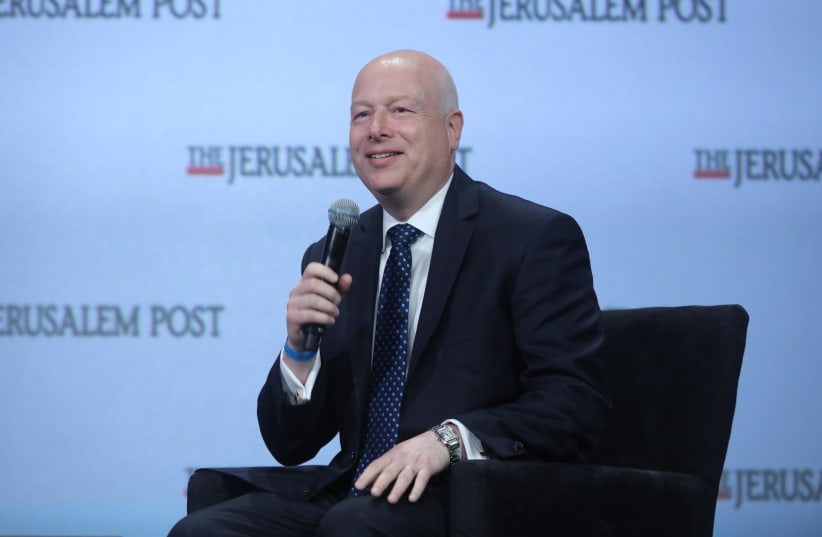US Special Envoy Jason Greenblatt has not found anything to criticize when it comes to Israel and its policies.
When asked in a CNN interview about Prime Minister Benjamin Netanyahu’s comments on annexing the West Bank, he said that he hopes no one will take “unilateral action, at least until a peace plan is proposed.”
Once it’s released, he said that “there is either traction or no traction on a peace plan, but we are not going to get involved in political statements like that,” adding that it’s a “theoretical conversation.”
When asked why he had not criticized the statements, but continues to criticize the Palestinians, Greenblatt said, "I think to equate the criticism of what I say about terrorists – to equate criticism of our efforts to bring peace – with political statements like that is not correct.”
"When I condemn the PA for those kinds of statements, it's saying that our peace plan is going to be born dead,” he said. “That's a very different thing. There is no comparison to the two statements."
He made it clear that, "the Palestinian Authority is not only condemning our peace plan, they're taking action to subvert it, to undermine it: to prevent peace from happening.
“They're not here. They didn't just say they're not coming, they're actually not here. That's much more than a political statement," he added.
When it comes to Israel and Netanyahu, "I haven't found anything to criticize that goes over the line," Greenblatt continued.
Asked about the Israeli occupation, the US envoy disagreed, saying that according to UN Resolution 242, “there is no border drawn… it’s not an occupation... There is a land dispute and the peace plan will have to deal with that.”
“When the Palestinians say that their economy isn’t doing well because of these restrictions,” referring to the security wall, Greenblatt made it clear that if there was peace, the restrictions “would not be there.”
In a second interview with i24 News, Greenblatt said that the Peace to Proseperty workshop had been a success and that he hopes “the Palestinian people have seen it. They should be excited because if we achieve a political solution to the conflict, they have a tremendous amount to benefit from,” he explained.
“We changed the conversation,” he continued. “Nobody can create a situation that doesn't include an economic package. What we heard from the investors is ‘we can make this happen. This is an investable type of project – if the political solution is there.’”
He added that they would “like to hear feedback from other countries. “We’d like to hear from the Palestinians and... the Israelis.”
Asked about Israel’s role in the plan, he said that it is “essential to the peace deal.”
“To have a successful economy for the Palestinians… there should be a connection with the Israeli economy. So having their input will be useful. And I think they could start very quickly, now that we’ve released the economic vision,” Greenblatt highlighted.
Asked about the political side of the deal, he said that they had not yet made a final decision, because of the September 17 elections in Israel. “The same logic would dictate that if we waited for the first time, we should wait for the second time.
“We wanted to get through Bahrain – and then President [Donald] Trump will make a decision on what he wants to do.”
Addressing the deep divide between the PA and Hamas, Greenblatt said that a comprehensive peace deal “cannot be created... unless we have a Palestinian voice that represents all Palestinians.
“I think more people need to focus on that rift,” he noted, making it clear that "it’s far more than a rift.”
“There are two million Palestinians suffering in Gaza who deserve better lives and it’s something we’ve tried to focus on, but more people need to be talking about it,” Greenblatt said. Yvette J. Deane contributed to this report.
